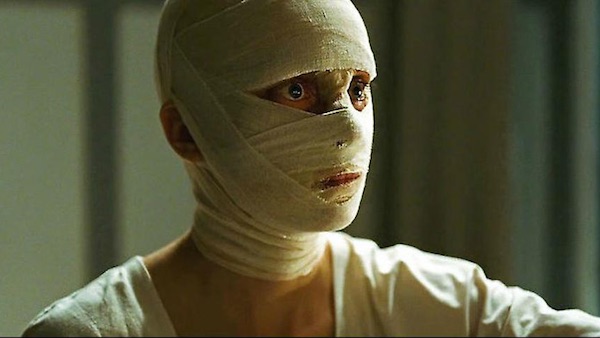Phoenix Review
Phoenix is such an evocative, playful title for German director Christian Petzold’s latest film. He introduces us — and his main character, Holocaust survivor Nelly — to a club called Phoenix early in the proceedings, but it’s nothing more than a red herring. The phoenix is this poor woman who’s life is a heap of ashes. She’s living in a place — post-WWII Germany — that’s been emotionally and morally leveled, while physically, it’s almost entirely rubble. Over the course of 100 minutes, however, we watch her find her blazing, red plume — oh, so much red — and rise. It’s a magnificent and devastatingly personal journey that’s executed to near perfection by Petzold and his team.
When we first meet Nelly (Petzold regular Nina Hoss), she’s bloody, bandaged, unrecognizable, and being transported back to Berlin from Auschwitz by her friend, Lene (Nina Kunzendorf). When a surgeon asks her what she’d like her new face to look like, she implores him to get as close to her old self as possible, despite the seemingly great opportunity to start completely anew following the unspeakable crimes committed to her and her people, not to mention a possible betrayal to the Nazis by Nelly’s non-Jewish husband, Johnny (Ronald Zehrfeld).
While she recovers, Nelly spends her time wondering the streets and nightclubs of Berlin, looking for Johnny, who she knows deep down must have been looking out for her when he accidentally led the Nazis to her hiding place. It’s at the Phoenix where she makes contact, though her surgery didn’t go perfectly, and Johnny tells this stranger that she could make a lot of money by passing off as his dead wife. He makes her a proposition: Live with him and learn everything there is to know about Nelly — her walk, her hair color, her mannerisms — and when she’s ready, they’ll collect Nelly’s sizable inheritance, which can’t yet be claimed because there’s no body.
It hardly needs pointing out to anyone who’s seen the film, but the ghost of Hitchcock’s Vertigo looms large over Phoenix in the same way that the spirit of Nelly seems to haunt Johnny. As they did in Vertigo, questions about identity pervade this picture and are examined from a myriad of angles: Is Nelly still Nelly after what happened to her? How much did her appearance or her relationship with her husband define her? The character of Lene offers a lot in terms of larger questions about both the German and Jewish identities. And Johnny’s deeds — past, present, and future — suggest his desire to create a new identity for himself is stronger than any other force in his life.
Phoenix is also an impeccably crafted film with sumptuous cinematography and production design that serve the film’s themes to perfection. The film’s Germany is often depicted in the dark and as a place where evil can lurk around any corner. Petzold counters these noirish, more dramatic sets with serene countryside, brimming with new life and love and hope. For Nelly, she seems to thrive outside of the city, lured in by its idyllic charms, but it’s an illusion. The entire film is about trying to come to grips with the fact that, at least for now, the reality is the rubble, and the way this film is shot, edited, and acted, underscores this tragedy beautifully.
Nina Hoss won’t get mentioned in many Best Actress of 2015 lineups because it’s a loaded category and because this is a smaller, foreign film. But man, that’d be a major mistake, for Hoss’ is a monumental performance that lives up to arguably the strongest character screenwriting of the year. There hasn’t been an arc as fully formed or satisfying as the one Nelly goes through in some time. When we meet her, she’s nothing but bandages, and by the end, she’s found herself and started to find a sense of acceptance for the many tragedies she’s had to endure. Hoss is as good at conveying Nelly’s helplessness as she is conveying newfound confidence. And there’s not much of the latter to be found, but when it is, Phoenix is as life-affirming as anything you’ll see this year.
If Phoenix is weak anywhere, it’s the way its plot machinations tend to propel the action further forward than its characters. Too often, Phoenix‘s story demands speed up Nelly’s and (to a greater extent) Johnny’s emotional development, but ultimately, they’re all going in the same direction, and it’s a very appealing, satisfying direction. Phoenix is at times scary and other times indescribably sad, but by the time the complete story is told, you can’t help but feel uplifted by the story of the woman who went to hell, came back, and ultimately told those who sent her there, “You can’t change me.”

















Pingback: Reviews: Phoenix (2015) – Online Film Critics Society